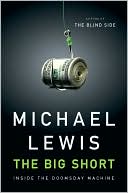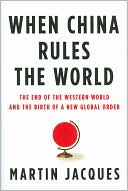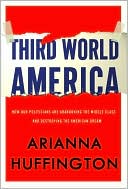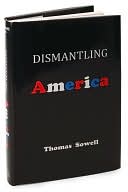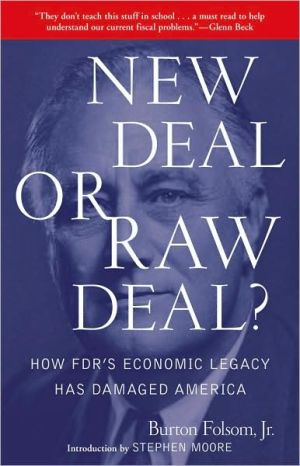Empire of Wealth: The Epic History of American Economic Power, 1607-2001
Throughout time, from ancient Rome to modern Britain, the great empires built and maintained their domination through force of arms and political power. But not the United States. America has dominated the world in a new, peaceful, and pervasive way — through the continued creation of staggering wealth. In this authoritative, engrossing history, John Steele Gordon captures as never before the true source of our nation's global influence: wealth and the capacity to create more of it.\ This...
Search in google:
For Gordon (a columnist for American Heritage), the secret behind American global power lies not in arms or politics, but in its economic power. Writing for a popular audience, he presents a narrative of the growth of that power from the arrival of the first English colonists to the end of the 1990s. His story of American agriculture, the growth of industry, changes in the banking system, and various economic scandals becomes, in the end, a celebratory history of the American economy. Annotation ©2004 Book News, Inc., Portland, OR The Washington Post - Thomas Kessner Gordon is a knowledgeable and relentlessly optimistic chronicler, relating with great panache how America's turn toward liberty, growth and innovation produced wonders of synergy. He captures well the epiphanies of inventors, industrialists and speculators as these legendary self-made men spun together the fibers of American dominance. And he vividly recreates the climate of exigency that made America's wars such powerful economic catalysts. An Empire of Wealth offers a Promethean narrative of America's rise to economic dominance. Gordon's account is both highly readable and enlightening.
Empire of Wealth\ The Epic History of American Economic Power \ \ By John Gordon \ HarperCollins Publishers, Inc.\ Copyright © 2005 John Gordon\ All right reserved.\ ISBN: 0060505125 \ \ \ Chapter One\ \ The Land, The People, and the Law\ \ Abraham Lincoln thought that a nation -- however much the whole might exceed the sum of its parts -- consists of nothing more than its people, its land, and its laws.\ For the nations of the Old World, the three parts are inextricably bound up together in the long individual histories of those nations. But the United States, like all nations founded by European settlers in the great expansion of Western culture that began in the late fifteenth century, has no ancient history. At the beginning of American history, there was only the land.\ The land that would become the United States presented a world that was at once hauntingly familiar and quite unlike the one in which the first European explorers and settlers had grown up. Western Europe was a world of dense population, concentrated in cities, towns, and villages; intense cultivation of arable areas; limited wildlife; and limited and carefully husbanded forests.\ America was located in the same temperate zone and featured often familiar trees, plants, and animals, along with some exotic new ones, such as raccoons, skunks, maize, and rattlesnakes. But beyond the rocky shore of what is now the state of Maine and the vast sandy beach that stretches nearly unbroken from New Hampshire to Mexico and far beyond, lay a wilderness, upon which the hand of its human inhabitants had lain very lightly indeed.\ This wilderness was a forest larger than all of western Europe, broken only by the occasional beaver meadow, bog, swamp, rock outcropping, mountain bald, and the slash-and-burn fields of Indians. It stretched from the water's edge to well past the Mississippi. From there it extended fingerlike along river and creek bottoms into the great plains that covered the center of the continent.\ This huge forest was, of course, not uniform. In the North, great stands of white pine -- the preferred wood for the spars and masts of sailing ships -- alternated with hardwood forests, where maples, sycamores, and ash predominated in the lowlands, oaks and hickories on the drier and higher slopes. Farther south were stretches of different species of pine along the Atlantic seaboard, and these reached inward to where they met hardwood forests at higher elevations.\ The eastern shore of North America is a welcoming one. A broad coastal plain made for easy settlement. Peninsulas such as Cape Cod and Delmarva; islands such as Long Island; and the barrier beaches farther south provided shelter for the early sailing ships. A series of rivers -- the Merrimac, the Charles, the Thames, the Connecticut, the Housatonic, the Hudson, the Raritan, the Delaware, the Susquehanna, the Potomac, the Rappahannock, the York, the James, the Peedee, the Ashley, the Cooper, the Savannah -- provided access to the deep interior for the small and relatively shallow-drafted vessels of the day. As early as 1609, Henry Hudson, an Englishman in the employ of the Dutch, sailed his full-rigged ship Half Moon 150 miles up the river later named for him, reaching as far as present-day Albany. An overland trip so far inland would have required a month or more. Hudson, although moving cautiously in unfamiliar and narrow waters, covered the distance in a week.\ And because these rivers had been formed when the sea level was lower than it is today, the subsequent rise drowned the rivers' mouths and provided harbors that rank among the finest on the North Atlantic. Many of the country's first cities -- Boston, Newport, New London, New York, Baltimore, Norfolk, and Charleston -- sprang up where these harbors are located.\ The climate of North America that the first settlers encountered was, like the land, both familiar and exotic. It is temperate rather than arctic or tropical, and with abundant rain. But, being on the eastern edge of a great continent, the climate is continental in nature, whereas western Europe's is maritime, and greatly tempered by the warmth of the Gulf Stream. American winters are much colder than western Europe's while the summers are hotter. The high and low temperature records for London, located north of the fifty-first parallel of latitude, are 99 degrees and 2 degrees and only rarely approach either extreme. The records for New York, just north of the forty-first, are 106 degrees and 15 degrees, and the extremes are approached with disconcerting frequency. By European standards, New England winters and southern summers were long and brutal.\ This vast area was not uninhabited. Dubbed "Indians" (les indiens in French, los indios in Spanish) through the ignorance of the first European explorers, who thought themselves on the fringes of Asia, the aboriginal inhabitants of North America lived throughout the continent. But by European standards, their population was very low relative to the size of the land. Exact figures are impossible to come by and even estimates vary widely, but the Indian population of eastern North America was probably somewhere between one and two million people at the time of Colombus. The number declined, sometimes rapidly, as increased European contact prior to settlement introduced diseases to which the Indians had no immunity.\ And the Indians were anything but culturally homogeneous, even by diverse European standards. There were approximately 250 languages being spoken in North America at the beginning of the European exploration (and about 2,000 in the Western Hemisphere as a whole). Even within languages, the people of North America were divided into many small, often mutually hostile tribes. Low-level warfare was chronic among these groups.\ Only the Indians of the Mississippi Valley, socially organized as chiefdoms, depended primarily on agriculture for sustenance. The Indians who lived on the eastern seaboard, mostly organized as tribes, were primarily hunter-gatherers. Less than 1 percent of the arable land of eastern North America was used for growing food crops. Using slash-and-burn methods, the Indians would grow corn, squash, and beans on a patch of land for a few years and then move to new fields as the fertility of the old ones declined.\ \ Continues...\ \ \ \ Excerpted from Empire of Wealth by John Gordon Copyright © 2005 by John Gordon.\ Excerpted by permission.\ All rights reserved. No part of this excerpt may be reproduced or reprinted without permission in writing from the publisher.\ Excerpts are provided by Dial-A-Book Inc. solely for the personal use of visitors to this web site. \ \
Introduction : the pursuit of happinessCh. 1The land, the people, and the law3Ch. 2In the name of God and profit21Ch. 3The Atlantic empire37Transition : the American Revolution59Ch. 4The Hamiltonian creation68Ch. 5A terrible synergy82Ch. 6Labor Improbus Omnia Vincit98Ch. 7The Jeffersonian destruction113Ch. 8New Jersey must be free!132Ch. 9Chaining the lightning of Heaven153Ch. 10Whales, wood, ice, and gold167Transition : the Civil War191Ch. 11Capitalism red in tooth and claw205Ch. 12Doing business with glass pockets223Ch. 13Was there ever such a business!240Ch. 14A cross of gold264Transition : the First World War285Ch. 15Getting prices down to the buying power295Ch. 16Fear itself317Ch. 17Converting retreat into advance332Transition : the Second World War349Ch. 18The great postwar boom363Ch. 19The crisis of the New Deal order382Ch. 20A new economy, a new world, a new war402
\ From Barnes & NobleOur armed forces are mighty, but the United States ultimately dominates the world economically, not militarily. John Steele Gordon's Empire of Wealth provides a fresh look at American history and the fundamental reasons for our success. This accessible history is overdue: American economic history has usually been the province of specialists, academicians, or ideologues. This richly detailed account is replete with fascinating detail. For example, Steele notes that Thomas Jefferson's visceral hatred of banks left the U.S. with the world's worst-regulated banking system for most of the next two centuries.\ \ \ \ \ Ron Chernow"Impressive. ... A deft, lively handling of an ambitious project that would have daunted almost any other writer."\ \ \ William GrimesMr. Gordon, a columnist for American Heritage who has written a history of Wall Street and the laying of the trans-Atlantic cable, does not offer much in the way of analysis. Rather, he presents the essential ideas and innovations that have propelled the American economy since its earliest days, and illustrates them with striking examples. He has produced the written equivalent of a PBS "American Experience" documentary, a gaudy cavalcade of facts, outsize personalities and fascinating inventions that moves along at a brisk clip.\ — The New York Times\ \ \ \ \ Thomas KessnerGordon is a knowledgeable and relentlessly optimistic chronicler, relating with great panache how America's turn toward liberty, growth and innovation produced wonders of synergy. He captures well the epiphanies of inventors, industrialists and speculators as these legendary self-made men spun together the fibers of American dominance. And he vividly recreates the climate of exigency that made America's wars such powerful economic catalysts. An Empire of Wealth offers a Promethean narrative of America's rise to economic dominance. Gordon's account is both highly readable and enlightening.\ — The Washington Post\ \ \ \ \ Publishers WeeklyThe word "epic" in the subtitle is a tip-off that instead of a critical history of the American economy, this book is a celebration of it. Nothing wrong with that, especially when the tale's told breezily and accurately. In fact, Gordon (The Scarlet Woman of Wall Street) notes the many stumbles and the frequent foolishness and corruption that attended the nation's rise as an economic powerhouse. The larger story of success is, in fact, an extraordinary one. The trouble is that the American economy, like every other, bends much out of shape. It has always provided opportunity but always with too much inequality. A full history of the American economy would take this into consideration in the past as well as the present, and Gordon's doesn't. Also, his book sometimes wanders off into irrelevant subjects, like the origins of the computer, but his grasp of the larger picture is sure and his prose bright. His chapter on Northern and Southern Civil War finances is a model of its kind. Those seeking an introduction to the general history of American economic power will find few better places to start, as long as they keep in mind that the nation's economy is not perfect, its benefits not unalloyed and its future domination of other economic powerhouses by no means assured. Agent, Katinka Matson. (Oct. 5) Copyright 2004 Reed Business Information.\ \ \ \ \ Foreign AffairsNo single volume can do full justice to the history of the American economy, but An Empire of Wealth makes a good effort. Gordon follows the story of the American economy from the first English settlements into the new millennium. This staunchly Hamiltonian book will shock readers accustomed to American economic histories that cast Ida Tarbell and William Jennings Bryan as heroes and Commodore Cornelius Vanderbilt and John D. Rockefeller as villains. Gordon argues that most of the nation's economic problems result from the Jeffersonian legacy of weak, localized, and poorly regulated financial institutions-a legacy that persisted into the savings-and-loan catastrophe of the Reagan administration. The absence of a central bank caused many of the excessive booms and busts of the nineteenth and early twentieth centuries; the absence of good central-banking governance contributed materially to the Great Depression. Gordon also gives the Progressives short shrift, arguing that private self-regulation generally worked better than toothless and often counterproductive government attempts. At its best when Gordon enlivens and explains early financial history-recent history is too complex to be captured fully in a short and general account, and Gordon's revisionist agenda makes his tale more complicated still-An Empire of Wealth fills a need: it recounts the history of the American economy from the standpoint of those who like it and the aÛuence it brings.\ \ \ \ \ Library JournalGordon, a contributing editor for American Heritage often heard on public radio's Marketplace, has managed to write an engrossing and comprehensive survey of U.S. economic activity from Colonial times through the fall of communism and the S&L crisis. He presents even the least vivid economic history, such as the late 19th-century debate over the gold standard, in a fascinating manner. Devoting commensurate space to each period, he ably presents the panoply of American economics through wars, technical innovations, financial booms and busts, social changes, and government regulation. His judgments are balanced and less polemical than Thomas J. DiLorenzo's in the recent How Capitalism Saved America, though like DiLorenzo he does do some anti-capitalism myth busting. He portrays 19th-century "robber barons" in generally positive terms, and while he praises Franklin Roosevelt for restoring American confidence after the Great Depression, he also argues that most of the New Deal programs were unsuccessful and economically shortsighted. This remarkably detailed and interesting book is highly recommended for both academic and public libraries.-Lawrence R. Maxted, Gannon Univ., Erie, PA Copyright 2004 Reed Business Information.\ \ \ \ \ Kirkus ReviewsForget about life, liberty, and the pursuit of happiness: American history is all about the Benjamins. America's present poised-for-empire stance is the logical consequence of American supremacy in the marketplace, writes financial historian Gordon (A Thread Across the Ocean, 2002, etc.). It's not only that the present economy is so vast and so varied, but also that "virtually every major development in technology in the 20th century-which was far and away the most important century in the history of technology-originated in the US or was principally industrialized and turned into consumer products here." It has not always been so, Gordon goes on to report. But he makes it clear that the European presence on the North American continent, in a variety of successive regimes, has always involved finance somewhere in the equation; as Gordon notes, Columbus's expedition included an accountant, the Jamestown settlement was a corporate venture, the founding of the Carolinas was a result of an overcrowded sugarcane industry in the Caribbean, and so forth. Some of what Gordon writes about is not news, but he brings considerable nuance to bear on his interpretations of our history: Massachusetts was able to take the world lead in shipbuilding, he writes by way of example, because, although its labor costs were very high, its material costs were so low that "New England could build a ship for about half the cost of building one in England," and this helped build an American economy that would soon become self-sufficient-one more reason not to be governed from abroad. Gordon's narrative is full of rich data on such matters as the growth of the transcontinental railroads, the origin of income andother common taxes, the abandonment of the gold standard, the rise of the consumer economy, and-most interesting of all-economic misjudgments and their reverberations throughout history. Solid raw material with plenty of value added. Just the thing for economics wonks, then, but lively enough to make for good airplane reading. Agency: John Brockman Associates\ \

